 W
WAmerican Education: The National Experience, 1783–1876 is a 1980 nonfiction book by American historian Lawrence A. Cremin, published by Harper & Row. The book is the second volume in Cremin's trilogy on US schools throughout the nation's history. In 1981, the book won the Pulitzer Prize for History.
 W
WThe Annals of University College. Proving William of Durham the True Founder: and Answering all their Arguments who Ascribe it to King Alfred is a 1728 book on the history of University College, Oxford by the college archivist and antiquary William Smith. The book, controversial upon its release, has since been hailed as a remarkable, and exceptionally scholarly, early work of college history.
 W
WEducating the Disfranchised and Disinherited is a 1999 biography of American General Samuel Chapman Armstrong and his associated normal school for freedmen, Hampton Institute, written by Robert Francis Engs and published by the University of Tennessee Press. The first full biography of its kind, the book portrays Armstrong as a complex politician and administrator in the postbellum period who balanced the needs of opposed parties surrounding the Virginia school: its African American students, Southern white neighbors, and Northern philanthropist funders. Previous works presented Armstrong in a polarized fashion, as either a savior or handicap for freedmen. The book emphasizes Armstrong's upbringing as a missionary in Hawaii in the development of his educational philosophy.
 W
WEducation and Democracy: The Meaning of Alexander Meiklejohn, 1872–1964 is the first full biography of Alexander Meiklejohn written by Adam R. Nelson and published by the University of Wisconsin Press in 2001. The title is not a complete biography but draws from five archives to show Meiklejohn through his own words. A popular figure in the early 20th century who has since faded, Meiklejohn was a philosopher and university president who championed unified knowledge, idealism, and Great Books curricula. The book is split into five sections based on the locations in which Meiklejohn lived: his undergrad, faculty, and administrative years at Brown University, his presidency of Amherst College, his time with the University of Wisconsin Experimental College, and his experience with adult education and free speech advocacy at Berkeley. Nelson portrays Meiklejohn as "contradictory, paradoxical, and quixotic" as he grapples with how to encourage students to pursue freedom and how a teacher can teach this while respecting student freedom.
 W
WEducation for Extinction: American Indians and the Boarding School Experience, 1875–1928 is a 1995 history book by David Wallace Adams that covers the history of assimilation era American Indian boarding schools.
 W
WThe Education of Blacks in the South, 1860–1935 is a history of African-American education in the American South between the Reconstruction era and the Great Depression. It was written by James D. Anderson and published by the University of North Carolina Press in 1988. The book won awards including the American Educational Research Association 1990 Outstanding Book Award.
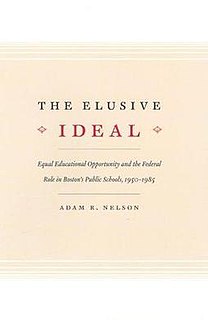 W
WThe Elusive Ideal: Equal Educational Opportunity and the Federal Role in Boston's Public Schools, 1950–1985 is a social history book written by Adam R. Nelson on the relationship between the Boston public schools and local, state, and federal public policy in the mid-20th century. The University of Chicago Press published the title in May 2005.
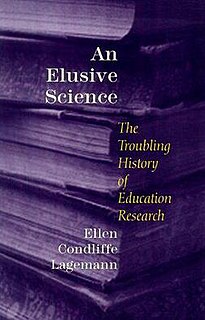 W
WAn Elusive Science: The Troubling History of Education Research is a history of American education research written by Ellen Condliffe Lagemann and published by University of Chicago Press in 2000.
 W
WThe Emergence of the American University is a non-fiction book in the history of education by Laurence Veysey, published in the 1965 by University of Chicago Press. It "trac[es] the development of the modern American university during its formative years from 1865 to 1910". It is based on and shortened from Veysey's doctoral dissertation.
 W
WThe Golden Passport: Harvard Business School, the Limits of Capitalism, and the Moral Failure of the MBA Elite is a 2017 history of the Harvard Business School and its influence, written by Duff McDonald and published by Harper Business.
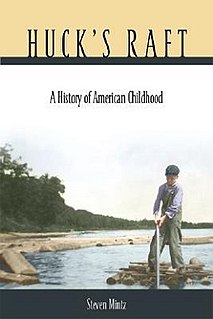 W
WHuck's Raft is a history of American childhood and youth, written by Steven Mintz. The 2006 H-Net review wrote that the book was the best single-volume history of its kind.
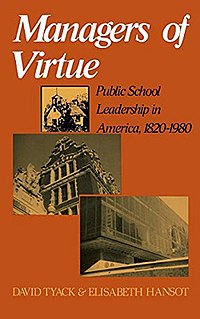 W
WManagers of Virtue: Public School Leadership in America, 1820–1980 is a history book by David Tyack and Elisabeth Hansot. Its first two sections discuss American educational leadership in the common school and Progressive eras, and its last part discusses the subsequent decline in school leader authority and public confidence.
 W
WThe Modern School Movement: Anarchism and Education in the United States is a history book about Ferrer Schools by Paul Avrich.
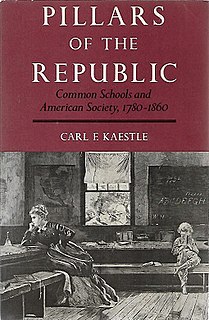 W
WPillars of the Republic is history book on the origins of the American common schools written by Carl Kaestle and published by Hill & Wang in 1983.
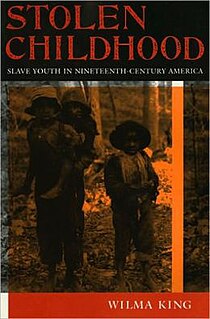 W
WStolen Childhood: Slave Youth in Nineteenth-Century America is a 1995 history book about nineteenth century slave children in America by Wilma King. As the first full-length book on the subject, it began the scholarship of slave childhood. The book uses historical documents to argue that enslaved children were deprived of experiences now understood to constitute childhood, due to early work responsibilities, frequent bodily and emotional trauma, and separations from family. The book covers themes of the children's education, leisure, religion, transitions to freedmen, and work expectations. It was published in the Indiana University Press's Blacks in the Diaspora series, and a revised edition was released in 2011.
 W
WThe Strike That Changed New York is a history book about the New York City teachers' strike of 1968 written by Jerald Podair and published by the Yale University Press in 2004.
 W
WTinkering toward Utopia: A Century of Public School Reform is a history of American public school reform written by David Tyack and Larry Cuban. It was published by Harvard University Press in 1995.